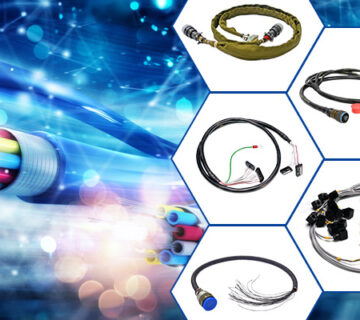Wire harnesses play a vital role across various sectors, including automotive, aerospace, medical, and industrial applications. While standard harnesses fulfil basic electrical functions, the specific demands of different industries often necessitate highly customized solutions. Custom wire harnesses improve performance, reliability, and safety, facilitating smooth integration into specialized systems. This blog delves into the significance of customization in wire harnesses, essential design factors, and the advantages that tailored solutions provide to various industries.
Why customization matters in wire harness design
The significance of customization in wire harness design cannot be overstated. Customization in the manufacturing of wire harnesses is crucial to address the distinct requirements of diverse industries, as standard harnesses may fall short in meeting intricate electrical and environmental specifications. By designing harnesses to align with specific voltage, current, and load requirements, optimized performance is achieved, ensuring operational efficiency. The use of tailored materials and protective features enhances durability, providing greater resistance to extreme temperatures, chemicals, and mechanical stress. Furthermore, adherence to industry-specific standards enhances safety by mitigating the risk of electrical failures and hazards. Additionally, seamless integration ensures that harnesses fit perfectly into specialized equipment, thereby reducing installation time and promoting cost efficiency, which ultimately lowers long-term maintenance and replacement costs.
Key considerations in custom wire harness design
Designing a custom wire harness necessitates meticulous planning to achieve optimal performance, longevity, and adherence to industry regulations. Various factors must be taken into account during the design process.
Specific application requirements
Different industries present distinct electrical and mechanical needs. For instance, aerospace wire harnesses must be both lightweight and robust, while automotive harnesses need to exhibit flexibility and resistance to heat. Industrial applications require designs that are resilient enough to endure harsh conditions, whereas medical devices emphasize compactness and precision.
Selection of wires and connectors
The choice of appropriate wires and connectors is vital for ensuring electrical efficiency and dependability. The wire gauge, type of insulation, and conductor material influence the harness’s capacity to manage power loads without risk of overheating. Additionally, selecting the right connectors is crucial for ensuring system compatibility and maintaining secure electrical connections.
Environmental considerations
Wire harnesses must be capable of withstanding a range of environmental challenges, such as extreme temperatures, moisture, vibration, and exposure to chemicals. Implementing protective measures like overmoulding, heat shrink tubing, and sealed connectors enhances durability, thereby preventing corrosion and mechanical degradation over time.
Shielding against EMI and RFI
In sectors such as telecommunications, aerospace, and medical devices, it is imperative to shield against electromagnetic interference (EMI) and radio frequency interference (RFI). Methods such as braided shielding, foil wrapping, and twisted pair wiring are employed to preserve signal integrity, ensuring reliable communication and data transmission.
Space limitations and routing
Custom wire harnesses are required to be meticulously designed to fit within the confines of equipment enclosures. Engineers focus on creating compact designs by employing multi-conductor cables or flat ribbon cables to maximize available space. It is essential to maintain the appropriate bend radius and flexibility to facilitate efficient routing of wires without subjecting them to excessive bending or stress, which could lead to potential damage. Furthermore, effective cable management is accomplished through the implementation of cable ties, clamps, and labels, ensuring that the wiring remains organized, secure, and easy to maintain.
Compliance with industry standards
Wire harnesses are obligated to adhere to rigorous industry regulations to guarantee safety, reliability, and quality. Certifications such as IPC/WHMA-A-620 establish the benchmarks for wire harness assembly and workmanship, while UL and CSA certifications ensure fire resistance and electrical safety. Additionally, ISO 9001 and AS9100 set forth quality management standards applicable to automotive, aerospace, and industrial sectors. By complying with these certifications and adhering to industry best practices, manufacturers can create custom wire harnesses that fulfil specific application requirements while ensuring durability, efficiency, and adherence to regulatory standards.
Industry-specific customization in wire harnesses
Each sector possesses distinct requirements for wire harnesses, necessitating customized solutions to guarantee reliability and optimal performance.
Automotive industry
The automotive sector demands wire harnesses capable of withstanding severe conditions while facilitating uninterrupted communication among electronic components. The use of high-temperature materials, such as Teflon and silicone coatings, safeguards against wire deterioration in elevated engine temperatures. Integration of CAN Bus technology allows for effective communication between vehicle control modules, enhancing both performance and diagnostic capabilities. Furthermore, weatherproofing through sealed connectors and protective sheathing shields the harness from potential damage due to water, dust, and chemicals, thereby ensuring long-lasting reliability.
Aerospace and defence
In the aerospace and defence industries, wire harnesses must be lightweight, exceptionally reliable, and resilient to extreme environments. The incorporation of lightweight materials, such as aluminium or composite shielding, contributes to a reduction in aircraft weight without sacrificing performance. Electromagnetic interference (EMI) and radio frequency (RF) shielding are essential for maintaining stable communication in high-frequency settings. To ensure robustness, wire harnesses in aerospace and defence undergo extensive testing, including assessments for extreme vibration, thermal cycling, and altitude variations, confirming their capability to function effectively under challenging conditions.
Medical equipment
In the realm of medical equipment, wire harnesses are required to adhere to stringent safety and hygiene regulations while facilitating accurate signal transmission. The use of biocompatible materials is critical, as the wires must withstand sterilization agents and bodily fluids. To ensure high signal integrity, shielded cables are employed to mitigate interference in diagnostic and imaging devices. Furthermore, the trend towards miniaturization is significant, as compact wire harnesses need to be accommodated within small, complex medical instruments without sacrificing their functionality.
Industrial machinery
In the context of industrial machinery, wire harnesses must exhibit exceptional durability to manage power distribution and control within factories and automated systems. Robust insulation is essential to safeguard against high voltages, mechanical abrasion, and exposure to oils or chemicals. Modular designs allow for straightforward replacement and upgrades within manufacturing processes, thereby enhancing efficiency and minimizing downtime. Additionally, the integration of smart technology is gaining traction, with harnesses now featuring sensors that provide real-time monitoring of electrical performance, ensuring consistent and reliable operation.
Miracle Electronics: Leading custom wire harness manufacturer in India
Miracle Electronics has established itself as a reputed custom wire harness manufacturer, offering superior solutions tailored for automotive, aerospace, medical, and industrial sectors. Equipped with cutting-edge facilities and a dedication to precision engineering, Miracle Electronics guarantees that each harness complies with international standards for performance, durability, and safety. Whether the requirement is for a simple wiring assembly or an advanced, high-reliability harness, Miracle Electronics delivers customized solutions that align with the specific demands of your industry.
The importance of customization in wire harness manufacturing cannot be overstated, as it is crucial for achieving optimal performance, safety, and seamless integration across diverse industries. By taking into account electrical specifications, environmental conditions, spatial limitations, and regulatory requirements, manufacturers can produce highly specialized harnesses that enhance efficiency and reliability. As technological advancements continue, the landscape of wire harness customization is set to progress, offering smarter, more resilient, and eco-friendly solutions for contemporary applications.




